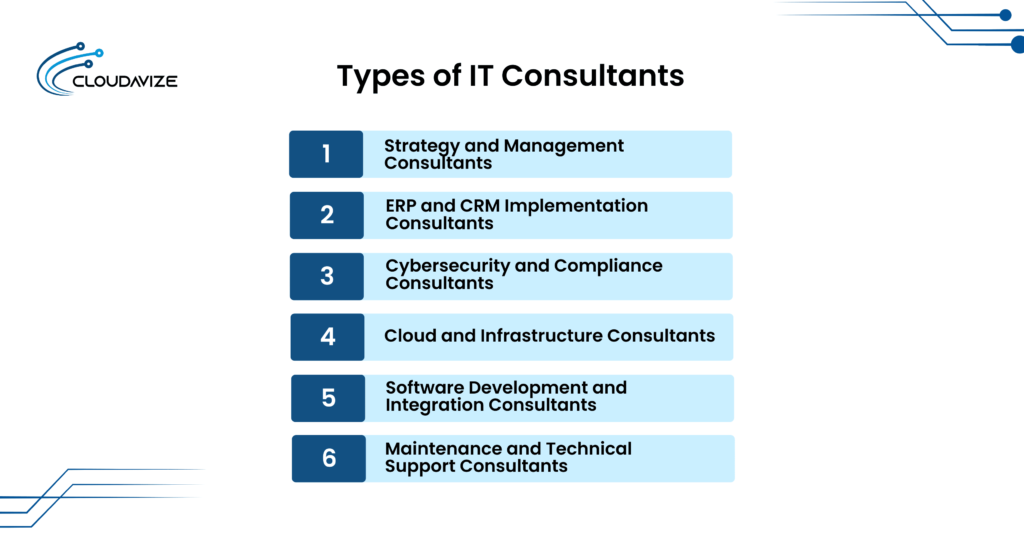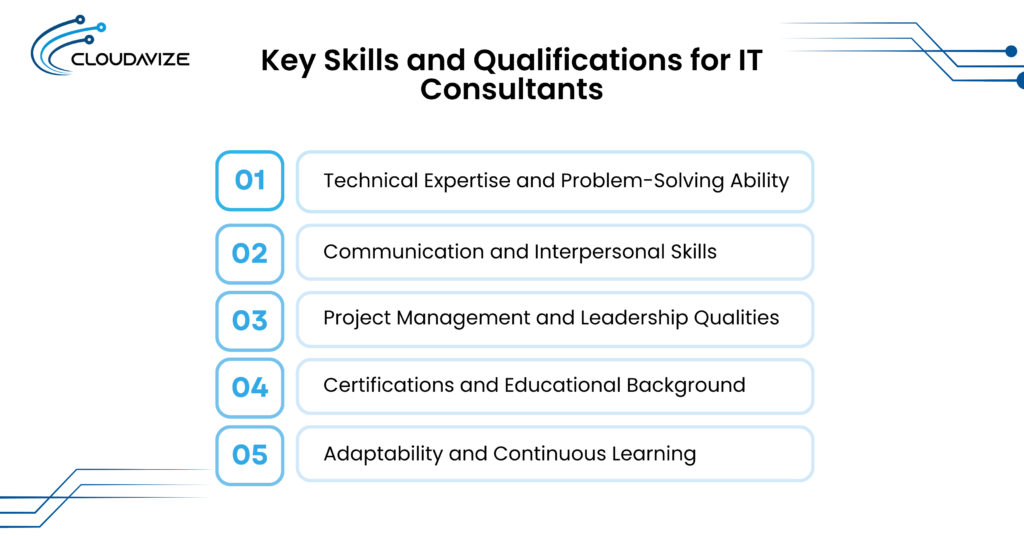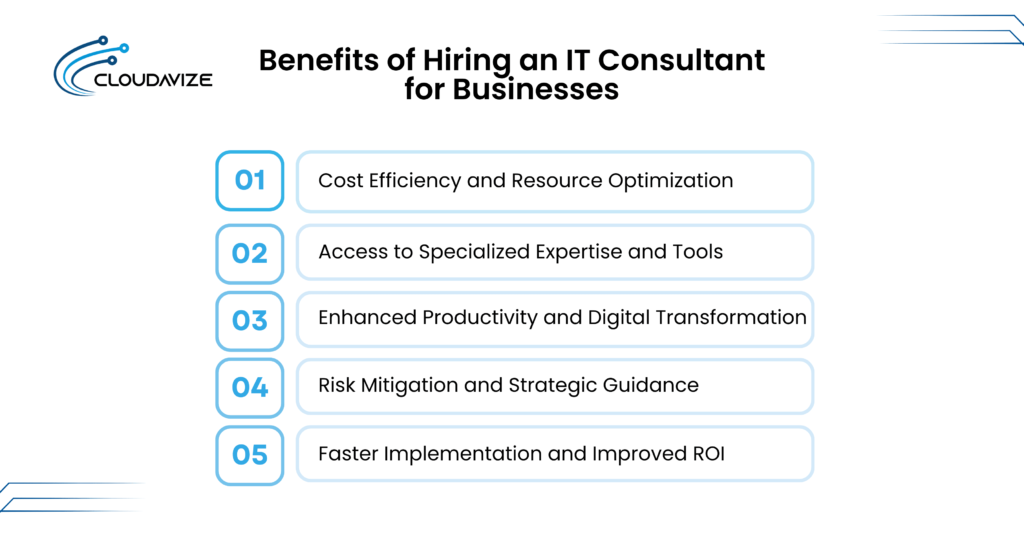An IT consultant is a technology expert who advises businesses on how to use information systems effectively to meet operational and strategic goals. They analyze current IT environments, identify gaps, and design strategies that solve technical challenges while improving performance, enhancing security, and reducing operational costs. Through this process, consultants support businesses in aligning technology with long-term goals and measurable outcomes.
Depending on the company’s needs, IT consultants may focus on specific areas of expertise such as cloud computing, cybersecurity, software integration, or infrastructure management. To perform effectively, they combine technical proficiency, analytical thinking, and strong communication skills, allowing them to connect complex IT capabilities with practical business strategies.
Hiring an IT consultant delivers clear advantages, including specialized expertise, improved efficiency, and faster technology adoption. Their guidance ensures that every IT decision contributes to efficiency, cost savings, and long-term growth. According to the U.S. Bureau of Labor Statistics, employment in IT consulting roles is expected to grow by 15% from 2022 to 2032, highlighting their pivotal role in helping organizations modernize systems, strengthen resilience, and achieve sustainable digital growth.
Table of Contents
Roles and Responsibilities of IT Consultants
IT consultants assess business needs, develop technology strategies, and manage implementation projects to ensure systems perform efficiently. They identify gaps, enhance security, and streamline operations while coordinating between technical teams and business leaders. Their role also involves providing expert advice, monitoring performance, and supporting long-term IT improvements that help organizations reduce costs and achieve measurable results.
Assess Business Needs and Identify Technology Gaps
To design effective IT solutions, consultants conduct a detailed evaluation of how existing technology supports day-to-day operations and long-term business goals. They review infrastructure performance, network reliability, data handling, and software integration to uncover weaknesses or inefficiencies. This includes analyzing workflow dependencies, user experience, and security posture to pinpoint obstacles that affect productivity or scalability. The findings form a clear roadmap for improvement, guiding technology investments that directly strengthen business performance.
Develop IT Strategies and Create Tailored Solutions
After identifying technology gaps, IT consultants design strategies that align digital systems with business priorities and measurable goals. They create implementation plans that outline required software, infrastructure upgrades, and integration steps to ensure every solution fits the client’s size, budget, and operational model. These tailored strategies often include recommendations for cloud adoption, cybersecurity frameworks, and workflow automation. By aligning each solution with business objectives, consultants help organizations improve efficiency, scalability, and overall performance.
Manage Projects and Oversee Implementation Processes
IT consultants manage technology projects from planning to execution, ensuring every phase meets defined business and technical objectives. They establish project timelines, allocate resources, and coordinate with internal teams and vendors to maintain progress and quality standards. Throughout the implementation, consultants monitor milestones, address any issues that arise, and ensure that solutions function as intended. This hands-on oversight ensures projects are completed on schedule, within budget, and deliver measurable results that enhance operational performance and reliability.
Collaborate With Clients and Technical Teams
Effective collaboration is central to an IT consultant’s role, ensuring clear communication between business stakeholders and technical specialists. Consultants gather client requirements, translate them into technical specifications, and facilitate discussions to keep expectations aligned throughout a project. They work closely with developers, engineers, and managers to validate solutions and resolve issues quickly. This cooperative approach minimizes misunderstandings, enhances project accuracy, and facilitates the delivery of technology outcomes that align with both operational and strategic business goals.
Ensure System Efficiency and Optimize Performance
To keep technology running at peak performance, IT consultants routinely evaluate how systems handle daily operations and evolving business demands. They review network reliability, software responsiveness, and hardware utilization to detect inefficiencies that slow processes or create risks. Through performance monitoring tools and data analysis, consultants pinpoint issues, implement configuration improvements, and recommend system upgrades. This continuous optimization process ensures reliable uptime, faster workflows, and scalable infrastructure that supports long-term organizational growth and operational stability.
Roles and Responsibilities of IT Consultants
IT consultants assess business needs, develop technology strategies, and manage implementation projects to ensure systems perform efficiently. They identify gaps, enhance security, and streamline operations while coordinating between technical teams and business leaders. Their role also involves providing expert advice, monitoring performance, and supporting long-term IT improvements that help organizations reduce costs and achieve measurable results.
Assess Business Needs and Identify Technology Gaps
To design effective IT solutions, consultants conduct a detailed evaluation of how existing technology supports day-to-day operations and long-term business goals. They review infrastructure performance, network reliability, data handling, and software integration to uncover weaknesses or inefficiencies. This includes analyzing workflow dependencies, user experience, and security posture to pinpoint obstacles that affect productivity or scalability. The findings form a clear roadmap for improvement, guiding technology investments that directly strengthen business performance.
Develop IT Strategies and Create Tailored Solutions
After identifying technology gaps, IT consultants design strategies that align digital systems with business priorities and measurable goals. They create implementation plans that outline required software, infrastructure upgrades, and integration steps to ensure every solution fits the client’s size, budget, and operational model. These tailored strategies often include recommendations for cloud adoption, cybersecurity frameworks, and workflow automation. By aligning each solution with business objectives, consultants help organizations improve efficiency, scalability, and overall performance.
Manage Projects and Oversee Implementation Processes
IT consultants manage technology projects from planning to execution, ensuring every phase meets defined business and technical objectives. They establish project timelines, allocate resources, and coordinate with internal teams and vendors to maintain progress and quality standards. Throughout the implementation, consultants monitor milestones, address any issues that arise, and ensure that solutions function as intended. This hands-on oversight ensures projects are completed on schedule, within budget, and deliver measurable results that enhance operational performance and reliability.
Collaborate With Clients and Technical Teams
Effective collaboration is central to an IT consultant’s role, ensuring clear communication between business stakeholders and technical specialists. Consultants gather client requirements, translate them into technical specifications, and facilitate discussions to keep expectations aligned throughout a project. They work closely with developers, engineers, and managers to validate solutions and resolve issues quickly. This cooperative approach minimizes misunderstandings, enhances project accuracy, and facilitates the delivery of technology outcomes that align with both operational and strategic business goals.
Ensure System Efficiency and Optimize Performance
To keep technology running at peak performance, IT consultants routinely evaluate how systems handle daily operations and evolving business demands. They review network reliability, software responsiveness, and hardware utilization to detect inefficiencies that slow processes or create risks. Through performance monitoring tools and data analysis, consultants pinpoint issues, implement configuration improvements, and recommend system upgrades. This continuous optimization process ensures reliable uptime, faster workflows, and scalable infrastructure that supports long-term organizational growth and operational stability.
How to Become an IT Consultant?
Becoming an IT consultant requires formal education, hands-on experience, and industry certifications. Most professionals start with a degree in computer science or information systems, gain experience in IT or consulting roles, and pursue certifications such as PMP, ITIL, or cloud credentials to build credibility and demonstrate technical and strategic expertise.
Educational Foundations and Relevant Degrees
Formal education establishes the technical and analytical foundation essential for a successful IT consulting career. Degree programs in technology and business disciplines provide the knowledge needed to understand complex systems and align them with organizational goals. Coursework in programming, network design, and data analysis helps build critical problem-solving and strategic-thinking skills.
Recommended degrees and focus areas include:
- Bachelor’s in Computer Science or Information Systems: Builds core IT and systems knowledge.
- Bachelor’s in Business Information Technology or Management Information Systems: Bridges business and technical understanding.
- Master’s in IT Management or Data Analytics: Strengthens leadership and analytical decision-making.
- Supplemental courses in Project Management, Cloud Computing, and Cybersecurity: Enhance specialization and practical expertise.
A strong educational background not only increases employability but also strengthens credibility and long-term professional growth in consulting.
Gaining Experience in IT or Consulting Roles
Hands-on experience is essential for transforming theoretical knowledge into practical consulting expertise. Working directly with IT systems, clients, and cross-functional teams helps aspiring consultants understand how technology supports real business operations. Early exposure to helpdesk management, network administration, or software implementation develops both technical competence and analytical ability. Experience in client-facing or collaborative projects also strengthens communication and problem-solving skills, which are vital for interpreting business challenges and proposing actionable IT solutions.
Typical experience-building path:
- Internships or technical support roles: Build troubleshooting, documentation, and teamwork skills.
- Junior IT or analyst positions: Develop system analysis, process evaluation, and reporting expertise.
- Project assistant or implementation roles: Strengthen planning, resource coordination, and solution delivery.
- Associate consultant positions: Apply consulting frameworks, manage client communication, and measure results.
Real-world experience creates adaptable consultants capable of solving problems efficiently and building strong client trust.
Obtaining Certifications and Specialized Training
Professional certifications validate an IT consultant’s technical skills and demonstrate a clear commitment to continuous improvement. They serve as formal recognition of expertise, helping professionals stay competitive and adaptable in an evolving technology landscape. These credentials strengthen credibility and assure clients that the consultant follows established frameworks and best practices in every project.
Key certifications that add measurable value include:
- PMP (Project Management Professional): Enhances project planning, leadership, and delivery accuracy.
- ITIL (Information Technology Infrastructure Library): Builds process efficiency and service management proficiency.
- AWS Certified Solutions Architect / Microsoft Azure Administrator: Validates cloud infrastructure design and deployment capability.
- CompTIA Security+ / CISSP: Develops cybersecurity, compliance, and data protection expertise.
- Vendor-specific credentials (Cisco, VMware, Salesforce): Strengthen system design and implementation specialization.
Certified consultants earn greater client trust, achieve higher compensation, and maintain a stronger competitive position in the consulting market.
Building Professional Networks and Industry Presence
Networking and professional visibility are essential for building a strong reputation and attracting new consulting opportunities. Active engagement in professional associations, industry events, and online platforms allows consultants to connect with peers, share expertise, and stay informed about evolving technologies. These interactions enhance credibility and help consultants expand their client base through meaningful connections and referrals.
Key methods for building professional visibility include:
- Joining associations and industry groups like PMI, ISACA, or CompTIA to develop trusted relationships.
- Attending conferences and webinars to exchange insights and learn from thought leaders.
- Maintaining an active online presence through LinkedIn, blogs, or case studies showcasing expertise and results.
- Participating in community initiatives or mentorship programs to strengthen reputation and industry impact.
Sustaining an active professional presence fosters long-term partnerships, career growth, and greater recognition within the consulting field.
Provide Ongoing Support and Continuous Optimization
IT consultants deliver continuous assistance after project completion to ensure systems remain efficient and effective. Their ongoing responsibilities include performance monitoring, regular system updates, process optimization, and user training to help staff adapt to new technologies. This continuous engagement allows consultants to detect issues early, fine-tune configurations, and recommend upgrades that sustain business value over time.
Typical post-implementation activities include:
- System health checks and software updates.
- Security audits and compliance reviews.
- Performance monitoring and process optimization.
- Employee training and technical support.
Proactive post-deployment support minimizes downtime, strengthens cybersecurity, and ensures a lasting return on technology investments.
Types of IT Consultants
IT consultants specialize in different areas such as strategy, enterprise systems, cybersecurity, cloud infrastructure, software integration, and technical support. Strategy consultants align technology with business goals, ERP and CRM experts manage enterprise software, cybersecurity specialists protect data, cloud consultants handle migration, and support consultants ensure reliable system performance.

IT consultants specialize in different areas such as strategy, enterprise systems, cybersecurity, cloud infrastructure, software integration, and technical support. Strategy consultants align technology with business goals, ERP and CRM experts manage enterprise software, cybersecurity specialists protect data, cloud consultants handle migration, and support consultants ensure reliable system performance.
Strategy and Management Consultants
Executive leaders rely on strategy and management consultants to align IT investments, infrastructure planning, and process design with overall business objectives. These consultants conduct in-depth assessments of corporate goals, financial priorities, and operational workflows to identify how technology can improve competitiveness and scalability. They develop long-term digital strategies, implementation roadmaps, and performance benchmarks that guide decision-making at the executive level. By connecting business vision with practical technology execution, they help organizations achieve measurable growth, efficiency, and sustainable strategic outcomes.
ERP and CRM Implementation Consultants
Deploying enterprise systems that integrate business operations and customer management is the core focus of ERP and CRM implementation consultants. These professionals plan and manage full implementation cycles, including system setup, data conversion, configuration, and integration with existing tools. They also design user training programs and ensure workflows align with organizational objectives. Through accurate data migration and automation, they help businesses achieve seamless operations, real-time insights, and stronger customer relationship management across departments.
Cybersecurity and Compliance Consultants
Safeguarding information systems and maintaining regulatory integrity are key objectives for organizations supported by cybersecurity and compliance consultants. These specialists perform in-depth security audits, identify vulnerabilities, and assess risks that could compromise business continuity. They design and implement protection measures such as encryption, firewalls, and multi-factor authentication while establishing company-wide security policies. Additionally, they train employees on compliance standards and data handling practices. Their work protects critical assets, prevents breaches, and ensures adherence to international regulations such as GDPR and ISO 27001.
Cloud and Infrastructure Consultants
The role of cloud and infrastructure consultants is to build, optimize, and maintain IT environments that enable scalability and performance across organizations. They evaluate infrastructure requirements, design secure and efficient cloud architectures, and manage migration processes for on-premises, hybrid, or multi-cloud deployments. These consultants ensure seamless integration between applications, data storage, and network systems while maintaining reliability and compliance. Their work enhances operational flexibility, reduces infrastructure costs, and provides high-performance computing environments that support continuous business growth and innovation.
Software Development and Integration Consultants
Building customized applications and ensuring system compatibility are key objectives for organizations supported by software development and integration consultants. These professionals handle requirement analysis, software design, coding, and testing to create reliable, scalable applications. They integrate platforms, databases, and APIs to establish seamless data exchange across departments while focusing on usability and performance optimization. Through structured development and integration processes, they deliver cohesive, efficient digital ecosystems that enhance productivity, improve collaboration, and support data-driven decision-making.
Maintenance and Technical Support Consultants
By providing continuous technical oversight and system maintenance, maintenance and technical support consultants ensure consistent reliability across all IT environments. They conduct regular updates, perform diagnostic checks, and address hardware or software issues to minimize operational disruptions. These professionals also assist users through troubleshooting, configuration support, and basic technical training. Their proactive approach to monitoring and issue resolution prevents costly downtime, enhances user satisfaction, and extends the overall lifespan and efficiency of critical IT assets.
Key Skills and Qualifications for IT Consultants
Delivering effective consulting outcomes requires a balanced combination of technical knowledge, analytical ability, and interpersonal competence. These skills work together to help consultants design systems, solve complex challenges, and communicate solutions clearly to clients. Strong project management and continuous professional development further reinforce credibility, adaptability, and long-term success in the IT consulting profession.

Technical Expertise and Problem-Solving Ability
Technical expertise forms the foundation of IT consulting, enabling professionals to evaluate complex systems and resolve issues that affect business performance. Consultants rely on deep knowledge of hardware, software, and digital infrastructure to assess technical challenges and recommend solutions that align with organizational needs.
Skills in system architecture, networking, and infrastructure design help consultants identify root causes quickly and implement reliable fixes. Their ability to analyze performance data, optimize configurations, and manage integrations ensures efficiency and precision in every engagement. Strong technical capability not only supports accuracy and trust but also drives consistent, high-quality project delivery.
Communication and Interpersonal Skills
Effective communication and interpersonal skills are essential for IT consultants to manage client expectations and coordinate effectively with diverse teams. These abilities help consultants translate technical information into clear, actionable insights that clients and stakeholders can understand, ensuring smooth collaboration throughout a project.
Core skills such as active listening, clear presentation, empathy, and negotiation build trust and ensure mutual understanding. By fostering open dialogue and consistent feedback, consultants keep teams aligned, reduce misunderstandings, and maintain long-term client relationships based on confidence, clarity, and shared success.
Project Management and Leadership Qualities
Successful IT consultants combine technical expertise with strong leadership to manage projects effectively from start to finish. Their ability to plan strategically and guide diverse teams ensures that objectives are clearly defined and progress remains on track.
Key project-management responsibilities include planning, scheduling, resource allocation, and risk mitigation. Consultants oversee coordination between stakeholders, monitor timelines, and resolve challenges proactively. Strong leadership not only improves team productivity and communication but also guarantees timely delivery and outcomes that align with client expectations and business goals.
Certifications and Educational Background
Formal education and professional certifications play a vital role in establishing an IT consultant’s credibility and technical depth. Academic programs in computer science, information systems, or business technology provide the analytical and problem-solving foundation necessary to understand complex IT environments and deliver strategic solutions.
Certifications further enhance expertise by validating practical knowledge and specialized skills. Credentials such as PMP, ITIL, and cloud-vendor certifications from AWS or Microsoft Azure strengthen project management, service delivery, and infrastructure capabilities. Continuous learning through certification ensures accuracy, compliance with industry standards, and lasting client trust in every engagement.
Adaptability and Continuous Learning
Thriving in IT consulting requires the ability to adapt quickly to new technologies, business models, and client expectations. As innovation accelerates, consultants must continuously refine their methods and technical knowledge to remain effective and relevant. This flexibility allows them to approach challenges creatively and deliver solutions that align with evolving business goals.
Sustained success in this field depends on ongoing learning and professional growth. Participation in advanced training, industry certifications, and hands-on exposure to modern tools fosters innovation and technical accuracy. Consultants who embrace change stay ahead of trends, anticipate client needs, and guide organizations through future-ready digital transformation.
Benefits of Hiring an IT Consultant for Businesses
Hiring an IT consultant helps businesses lower technology costs, improve system efficiency, enhance cybersecurity, and accelerate digital transformation. Consultants bring specialized expertise that streamlines processes, reduces downtime, and ensures optimal use of IT resources. Their strategic guidance improves productivity, aligns technology with business goals, and delivers measurable ROI, providing both immediate operational gains and lasting competitive advantage.

Cost Efficiency and Resource Optimization
IT consultants help businesses optimize resources by reducing unnecessary expenses and maximizing the value of existing technology investments. They assess current IT systems, identify cost-draining inefficiencies, and implement scalable, cost-effective solutions that improve performance and support future growth. By streamlining processes, consolidating software licenses, and recommending smarter infrastructure use, consultants enhance operational efficiency and return on investment. Their expertise ensures stronger financial control and measurable long-term savings through continuous performance improvement.
Access to Specialized Expertise and Tools
By engaging IT consultants, businesses gain access to specialized expertise that is often unavailable internally. These professionals possess deep proficiency in niche tools, frameworks, and industry standards that enable organizations to implement modern technologies quickly and effectively. Their experience with cloud systems, cybersecurity protocols, and automation platforms ensures accurate integration and faster adoption. Access to this expert insight and proven methodology enhances project outcomes, reduces implementation risks, and drives long-term operational efficiency.
Enhanced Productivity and Digital Transformation
Through digital transformation initiatives such as automation, cloud adoption, and system integration, IT consultants help businesses enhance productivity and modernize operations. They streamline workflows, reduce manual processes, and deploy collaboration tools that improve communication and efficiency across departments. Through technology-driven process improvements, consultants enable faster decision-making and smoother data exchange. These initiatives deliver measurable productivity gains, shorten turnaround times, and optimize resource utilization, allowing organizations to achieve higher performance and sustained growth.
Risk Mitigation and Strategic Guidance
Risk mitigation is a central function of IT consulting, ensuring that technology decisions align with business objectives and comply with regulatory standards. Consultants evaluate system vulnerabilities, identify potential threats, and develop contingency plans that minimize operational disruptions. They also provide strategic guidance to executives, using data-driven insights to support informed decision-making and long-term planning. Through proactive oversight and preventive risk management, IT consultants help organizations avoid costly losses, maintain compliance, and ensure business continuity under evolving conditions.
Faster Implementation and Improved ROI
IT consultants accelerate technology deployment by optimizing implementation workflows, reducing project delays, and maximizing return on investment. They establish detailed project plans, coordinate agile execution, and conduct rigorous testing and evaluation to ensure timely and efficient rollouts. Each phase is carefully managed to maintain quality and alignment with business objectives. This expert-led implementation minimizes downtime, promotes faster user adoption, and delivers measurable financial results that strengthen overall operational performance and long-term profitability.
IT Consultant Salary Insights
IT consultant salaries depend on experience, specialization, certifications, and geographic location, with senior consultants often earning over twice as much as entry-level professionals. Compensation rises with advanced skills in areas like cloud computing, cybersecurity, and ERP systems. Certifications, project success rates, and regional demand further influence pay levels, helping both professionals and employers set realistic expectations and fair benchmarks.
Average Salary by Experience Level
Total pay for IT consultants ranges from $83K to $151K per year, with a median salary of $111K annually, according to Glassdoor. Salary growth aligns with experience, expanding technical expertise, and project complexity. Consultants who manage larger implementations or hold advanced certifications such as PMP or AWS often fall in higher pay brackets due to their strategic value and leadership responsibilities.
Average salary ranges by experience level:
- 0–1 years: $62K – $106K per year
- 1–3 years: $66K – $111K per year
- 4–6 years: $75K – $127K per year
- 7–9 years: $80K – $135K per year
- 10–14 years: $89K – $151K per year
- 15+ years: $101K – $173K per year
Consistent skill development, leadership growth, and technical specialization significantly increase earning potential and long-term career value.
Differences by Industry and Specialization
IT consultant salaries differ widely across industries and job specializations, driven by the complexity of systems, data sensitivity, and the strategic importance of technology. Sectors such as finance, technology, and healthcare typically offer higher compensation due to their reliance on secure, large-scale IT systems. Professionals working in advanced or high-security sectors such as cybersecurity, ERP systems, or cloud architecture tend to earn higher compensation due to specialized skill demands and critical project responsibilities.
| Job Title | Annual Salary | Monthly Pay | Hourly Wage |
| VMware Consultant | $125,999 | $10,499 | $60.58 |
| IT Internal Audit | $115,198 | $9,599 | $55.38 |
| Bank IT Manager | $74,718 | $6,226 | $35.92 |
| Technical Information Specialist | $70,302 | $5,858 | $33.80 |
| Forensic Specialist | $61,156 | $5,096 | $29.40 |
Source: ZipRecruiter
These variations highlight how specialization and industry focus directly influence compensation, with technical and security-driven roles commanding higher pay and stronger career advancement potential.
Regional Salary Variations
IT consultant salaries differ notably across regions due to variations in demand, cost of living, and local talent availability. High-demand areas such as California, New York, and Washington offer premium pay to attract experienced consultants, while smaller markets typically present more moderate compensation. Remote consulting has started balancing these differences, giving professionals broader earning opportunities regardless of location.
| Location | Average Annual Salary |
| Houston, TX | $79,314 |
| Miami, FL | $83,060 |
| Dallas, TX | $85,908 |
| Philadelphia, PA | $87,632 |
| Chicago, IL | $89,531 |
| San Diego, CA | $92,202 |
| New York City, NY | $95,009 |
| Seattle, WA | $98,829 |
| San Jose, CA | $101,779 |
| San Francisco, CA | $102,316 |
Source: ZipRecruiter
Understanding these regional pay trends helps consultants and employers create fair, location-specific compensation strategies that reflect true market conditions.
Key Factors Influencing Pay
Several measurable and qualitative factors influence how much IT consultants earn across industries and regions. Compensation is shaped by a consultant’s education, technical certifications, years of experience, and the size or scale of the company they serve. Each factor contributes differently to earning potential and career advancement.
Primary factors affecting IT consultant income include:
- Education: Higher degrees increase credibility and qualification for senior roles.
- Certifications: Credentials like PMP, ITIL, or AWS validate specialized skills.
- Experience: Broader project exposure raises market value and leadership potential.
- Specialization: Expertise in high-demand areas like cybersecurity or cloud boosts pay.
- Company Scale: Larger enterprises typically offer higher salaries and benefits.
Professionals who invest in continuous learning and measurable performance outcomes achieve stronger earnings and greater job stability.
How IT Consultants Help Businesses Achieve Growth and Efficiency?
IT consultants drive measurable business growth by aligning technology strategies with organizational goals and performance objectives. Their work focuses on improving operations, reducing costs, and enhancing decision-making through data-driven insights and digital transformation.
Key ways IT consultants help businesses achieve growth include:
- Process Optimization: Streamlining workflows to eliminate inefficiencies and save time.
- Digital Transformation: Modernizing systems to increase productivity and adaptability.
- Data-Driven Strategy: Using analytics to support informed executive decisions.
- Technology Integration: Ensuring seamless connectivity across platforms and departments.
- Performance Monitoring: Tracking KPIs to maintain operational efficiency and measurable ROI.
Through long-term collaboration, IT consulting fosters innovation, agility, and sustainable success built on proven performance outcomes.



